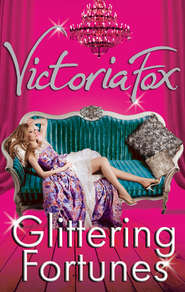По всем вопросам обращайтесь на: info@litportal.ru
(©) 2003-2024.
✖
The Silent Fountain
Настройки чтения
Размер шрифта
Высота строк
Поля
‘I don’t know, Daddy,’ said Vivien meekly.
Gilbert was making an effort to remain calm. She could tell by the lightly throbbing vein in his temple. Just say it. Say what he wants to hear.
Above her father’s head, Jesus stared down at her from the cross, feet nailed with a bolt, a bloody crown of thorns around his head. The crimson slash in his side grinned horrendously. His chest was concave, his ribs visible. He died for your sins. Words Vivien heard every day of her life, and she didn’t understand them now any more than she had when they were first uttered. Vivien had never sinned – at least not in any way so serious as to condemn a man to death. Telling Mother that next door’s dog had eaten the vanilla-cream muffins when in fact it had been her didn’t count.
‘Yes, you do,’ said her father.
Say it. Or you know what will happen. Her mother did, too. Millicent was stiff as a board at her side, her head bowed. Why did she never stand up for herself – or for her daughter? Like when Vivien asked to play with the Chauncey kids one evening on their lake swing, or she was invited to Bridget Morrow’s birthday party and had the idea of going dressed as her favourite movie star, or she wanted to run barefoot across the prairie after lunch and chase the wild ponies who grazed there, her mother would fold her arms and say brittly: ‘Your father won’t like it.’ And that was the end of that.
What did her father like? Apart from God, she didn’t know.
Did he even like her?
‘He said,’ Gilbert capitulated in a strained voice, its menace perceptible only to his family, ‘I shall take your Fear away, and grant you everlasting Peace!’
The pews exploded once more in adulation.
But there would be no peace for them tonight.
*
Gilbert Lockhart was a supreme minister. His disciples exalted him. Vivien watched him outside church every Sunday, shaking hands, issuing blessings, and wondered where this kind, caring man went the instant they arrived home on their porch.
Today, she didn’t wait to find out. No sooner were they inside than she ran upstairs to her bedroom. Her father was mad. Crazy mad. She’d seen it in his eyes on the drive back, their pearl-grey Cadillac bouncing along the dirt track, how he glanced at her every so often in the rear-view, cold, threatening, a Just you wait kind of glance.
She wished she had a lock on her door. Instead, Vivien hauled a chair to lever against the knob. She pressed her ear against the wood. No footsteps yet. She focused on slowing her racing heart, safe now in her room, where no one could get her.
Downstairs, she could hear his booming voice, and her mother’s answering one, frail and meek, conciliatory. The weak attempt Millicent would make at dissuading him from his wrath, but as soon as he struck her the fight would go out of her. Vivien balled her fists. She had known at church that it would end this way, but even if she could go back and do it differently, she wouldn’t.
I don’t believe what he says, she thought. And it wasn’t that she didn’t believe in God – she didn’t know what she believed in, it was too early to say – but she didn’t for one moment accept any kind of creed whereby a man could be a saint to his congregation, could spout about good and evil and fairness and forgiveness, then beat his wife and daughter black and blue the second they were out of sight. That wasn’t a religion Vivien was interested in. She couldn’t lie for him. She couldn’t lie to herself.
Opening her closet, she stared at the bag inside. Take it. Go.
It was everything she needed, enough to get started. Over the past year, sitting cross-legged on her bed, deep in the deep, dark night, when the house was quiet and the only light left on in the town was the light of the moon, it had given Vivien solace to choose these belongings, fingering the hem of a blouse or the edge of a pin. I will leave this place. I will get away. I will, I will… She had almost been able to forget the stinging welts across her back, like paint slashed on a canvas, slowly drying.
Vivien knelt to the bag. In the front pocket was a crumple of bills, money she had collected from girls at school for completing their homework. What else had she to do with her time? While girls like Felicity and Bridget were taken dancing or to the pictures, Vivien was made to study every hour she wasn’t in class. Once, she had completed her Math prep early and asked to be excused; Gilbert branded her a liar, smacking her and telling her she would never be clever enough to finish so quick, and she could forget about leaving the house until she had. From then on, Vivien resolved to take her classmates’ work home, too. Gilbert told her she wasn’t allowed a job, wasn’t allowed to earn, because money gave women ‘ideas’. Ironically, it was he who facilitated her first transactions, and he who had set her in the direction of escape.
From downstairs came the sound of china smashing… followed by silence. Vivien slammed the closet shut, diving to the security of her bed.
Something crackled beneath her head. Carefully, she slid her hand beneath her pillow to withdraw the folded paper, before with reverence she flattened it out. It was like looking through a window into another universe. Someone’s sister in the top grade had had the poster pasted up inside her locker. Vivien envied it, seeing it in the corridor; she had never clapped eyes on anything so glamorous and stylish, a beautiful woman in a mini-skirt, and a man gazing on with a look in his eye she was too young to pinpoint but that promised something sweet and strange. Vivien had paid the girl a week’s earnings, and the girl, about to chuck the wrinkled old thing away, accepted. Audrey Hepburn in How to Steal a Million – that impish beehive, a thousand miles from Vivien’s own constructed ponytail, promised fun and naughtiness and freedom; and her daringly exposed knees, never to be seen in Claremont Town, at least not without a slap on the thigh that bloomed humiliated-red. The poster had fed her appetite for Hollywood, as had a cherished photo she’d found in last month’s paper of Marlon Brando (was it possible that people that handsome existed? They certainly didn’t in Claremont) and a glossy print of Sophia Loren, so exotic and dangerous.
The impulse to conceal them had been instant. There was no place in her father’s world for such things. Vivien could hear Gilbert’s words without needing to provoke them: Hollywood was a filthy breeding ground of vanity and wickedness. Money and fame were for sinners; they held no value in the eyes of the Lord. Anyone who followed that road was heading for disaster – that way the Devil’s arms opened.
Every night before sleep, Vivien would look at her pictures, these faraway people, and remind herself that they were real, that this life did exist, many miles from here and who knew how many risks beyond, but it did. It did.
And maybe, one day, she would find the courage to follow.
In the meantime, it gave Vivien pleasure to keep a secret from her parents. They fundamentally outnumbered her. How she yearned for a brother or a sister! Once, she had thought there was a chance. Vivien had prayed for an ally, a friend, and her father always told her that God answered prayers – but He hadn’t answered this one. There had been a time, years ago, hazy now in her memory, when Millicent had brightened, blossomed – then one night, when the stars were silver-bright, she and Gilbert had driven in a rush to the hospital. At dawn, her mother had returned pale and ruined, and Vivien had found a pair of bloody knickers in the laundry basket. Later, when she finally plucked up the mettle to ask after a possible sibling, she had been slapped hard round the cheek and the subject had never been raised again.
Thump, thump, thump… The footsteps made her wait longer than usual, but when they came they were unmistakeable. A slur to his gait: he’d been drinking, hence the delay. What was it the Bible said about abstinence? Gilbert Lockhart chose which orders to obey. More often, he made up his own. The belt was one of them.
Quickly, Vivien bundled the poster back under her pillow. She watched the door until, sure enough, the brass knob began to rattle. There was a brief quiet, then a shove, and the chair began to shake. Then there her father was, a glorious rageful vision, red-blotched and a fire in his eyes, his hands like rocks at his sides.
‘You stupid girl,’ he spat. ‘You know what happens when you disobey and yet still you do it. You got your mother into trouble as well. Are you happy now?’
I’m not happy. I can never be happy here – with you.
But still Vivien could not bring herself to say sorry, when there was nothing to be sorry for. She sat completely still, taking her mind away to a place he couldn’t touch, a place that was hers alone. She imagined she was Audrey Hepburn or Sophia Loren. Like a golden light, fantasies of a glittering Hollywood encircled her, a life in the sunshine, by the sea, with a man who loved her. The bag in the closet shone in her heart like a beacon, its promise mere feet from where her father stood but utterly invisible to him. He was the stupid one, the blind one. He always had been.
‘Showing me up like that,’ he seethed. ‘You deserve to be punished.’
As Gilbert drew his belt from its buckle, Vivien knew what she had to do – kneel on the floor, lean over the bed, just like she was begging – and it was easier not to fight. Physically, she would always lose. She had to be cleverer than that. And as the first stroke stung the backs of her thighs, that hot, searing pain she knew so well, she prayed. Not to God, or any god her father recognised. She prayed to herself – to be strong, and to do what she must. I will get out of here, she vowed.
Tomorrow, I’m running away.
CHAPTER FIVE (#ulink_3afa18fa-765b-5004-b739-40004932b6cd)
Italy, Summer 2016
‘You must be Lucy.’
I am greeted at the door by a woman, her hair scraped back in a bun, not unfriendly looking but at the same time I’m hesitant to call it a greeting because it’s distinctly lacking in warmth. She introduces herself as Adalina, ‘personal maid to Signora’. As she ushers me over the threshold, her manner is one of a hostess at a dinner party, obliged to show guests around but with her mind perpetually on some other distracting matter: if everyone’s glasses are filled, who is mingling with whom, if the canapés are running low. I smile, deciding friendliness is the best approach.
It’s impossible to hide my surprise as I step into the hall. Adalina glances at me with satisfaction. Working here every day, she must forget the impact the place has on new arrivals. For a moment, I’m stunned.
‘It isn’t what you expected,’ says Adalina.
I gather myself. ‘I’m not sure what I expected.’
There is one word for the atrium in which we are standing – enormous – and the word echoes in my head, those round, open vowels, just as it might around the ceiling’s frescoed vaults. A shaft of sunshine spills from a circular window in the cupola, warming the flagstone floor. It’s church-like, and breathtakingly beautiful – but at the same time somehow tragic, and I stare up at the painted figures on the arched ceiling, angels and terrors, weeping and clasping, a maelstrom of human experience. In an alcove by the door, a finely painted Madonna in Prayer kneels, her hands together and head lowered, in blessing or mourning for visitors, perhaps both.
Adalina rings a large, heavy bell, one that brings to mind wake-up calls in boarding school dormitories, and an old man appears at the foot of the stairs. He wears a faded blue cap and frayed dungarees, and has the weathered features of someone who spends all day outdoors. ‘Take these to the east wing,’ instructs Adalina. ‘The Lilac Room.’ She motions to my bags and dutifully the man nods. His age suggests he’s less equipped to take the cases than I am, but, as I reach to help, he hauls the load on to his shoulder and I can picture him working the surrounding land, carrying hay bales or injured calves across his back as lightly as a satchel.
‘That’s Salvatore,’ Adalina says, when he’s gone. ‘Don’t waste your time with him.’ She taps the side of her head with her finger. ‘He’s not right. Hasn’t been for thirty years. Signora keeps him on out of pity.’
My interest must be visible, because Adalina assesses me for a moment before saying quite mildly: ‘Remember, Lucy, you are here to keep this house in order. Any questions you have about the building, the village, the city, you may ask me. Any questions you have about the people who live here, keep them to yourself. Do you understand?’ There’s no threat in this, just curiosity, as if Adalina is getting the measure of me, as if this is an extension of that bizarre interview.
‘Of course.’
‘Discretion is everything,’ says Adalina. ‘Now, come, I will show you the rest of the house, but be aware it will take time to familiarise yourself. We have just two rules. One,’ she says, gesturing to a closed door, leading, I surmise, to that part of the mansion I saw was covered in strangling vines, ‘the west wing is out of bounds. Two, so is the top floor. I will show you when we get there. It will not be hard for you to obey these rules – those parts are always locked so you will know if you trespass.’
Trespass. The word conjures Biblical transgression. Sin. Forbidden fruit.
I think of him.
‘This way, Lucy.’
Adalina leads me through the hall.











